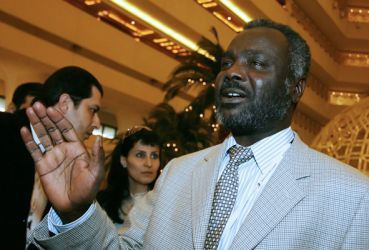“Sudan Call” forces to discuss common action strategy soon: JEM leader
May 26, 2015 (PARIS) – The Justice and Equality Movement (JEM) leader, Gibril Ibrahim, disclosed that the opposition “Sudan Call” forces would meet within the upcoming weeks to develop a common action strategy.

Sudan’s ruling National Congress Party (NCP) refused to attend a meeting in Addis Ababa last March to discuss issues pertaining to the national dialogue process and its procedures.
Khartoum at the time said the African Union High-Level Implementation Panel (AUHIP) mediation team did not coordinate with the government on who would participate in the meeting. It further said that it would be held at the wrong time given the elections which took place in April.
Gibril said the “Sudan Call” forces would meet within two weeks to discuss the next step, stressing “the meeting would determine the new position towards the dialogue besides unification of opposition forces”.
“We hope the meeting could be held during the coming two weeks. It may be held between 11 to 12 June in one of the European capitals,’’ he further said.
In a letter sent on 3 April to the African Union Peace and Security Council (AUPSC) and the AUHIP, National Umma Party (NUP) president Sadiq al-Mahdi and chairman of Sudanese Revolutionary Forces (SRF) Malik Agar said concerned by the government’s lack of political will and called to establish a new peace process.
They proposed to create a single negotiating track for the peace process replacing the two track one process approach adopted by the AUPSC last September.
“Sudan Call” forces, including the SRF, NUP and the NCF, would participate in a hearing session about Sudan at the European Parliament in the French city of Strasbourg on 9 June.
Also, several opposition leaders are also expected to take part in an annual meeting about Sudan to be held in Hermansburg, Germany, after the hearing.
JEM leader pointed to the need for developing a unified opposition stance towards the regime, arguing that would enable the African mediation in its discussions with the government and allow it to furnish the regional and international partners with the opposition’s vision on dialogue.
“We [the opposition] were asked to provide a clear position and that is what we seek to submit to the African mediation, the European Union, the Troika countries and the rest of the concerned bodies,” he added.
SERIOUS DIALOGUE
Gibril called on the government to take into account the large popular boycott of the recent elections and to engage in a serious dialogue. He further said the opposition would positively respond to such approach towards dialogue.
“If the [government] is serious about reaching genuine solutions to save the country, the opposition will not turn it away,” he said.
But he warned that dialogue wouldn’t be productive unless it leads to “a structural change in the system of government”.
JEM leader acknowledged existence of differences among opposition forces about how to deal with the regime, saying “we don’t claim the opposition forces work in full harmony”.
“Some [opposition forces] refuse to engage in dialogue with Khartoum and in fact the latter’s [stances] make them stick to their refusal because each time it (the government) demonstrates lack of seriousness towards achieving peace,” he added.
He stressed the need for the opposition to be ready to change the regime or to engage in dialogue with it if it shows seriousness, underscoring they must be open to all options.
It should be recalled that the rebel Sudan Liberation Movement – Abdel Wahid al-Nur (SLM-AW) refuses to engage in dialogue with the regime until several conditions were met including disarmament of government militias and provision of security for civilians.
Also, the opposition alliance of the National Consensus Front (NCF) refuses to engage in the dialogue until the requirements of a conducive environment are met.
However, they agreed to take part in the pre-dialogue meeting, on the condition that the national election will be postponed, all political detainees are released, and the NCP agrees on the establishment of a national transitional government.
(ST)
